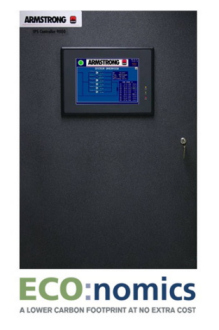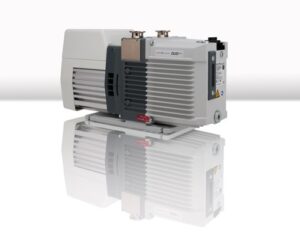IPS – an ECO:nomics Low Carbon Solution from Armstrong
In the coming months Armstrong will be launching ten low carbon solutions under its ECO:nomics brand. The first of these is the IPS controller which offers unrivalled levels of energy efficiency and carbon reduction in multi-zone, multi-pump HVAC heating and chilled water applications.

Armstrong IPS Controller
Energy savings of up to 47.5% can be made (compared to a constant speed, constant volume system) by harnessing IPS advanced control technology in systems incorporating variable speed drive pumps.
These efficiencies can be achieved because the IPS controller processes field signals to determine the sequencing of any optimal duty point of any pump. Pumps are controlled on a ‘best efficiency’ basis and utilise ‘wire to water efficiency’ control to optimise energy consumption of all system components at all times.
In addition to considerable cost saving, the improved level of control leads to a more comfortable environment for building occupants, and ensures that equipment within the system has a longer operational life with fewer maintenance requirements. Incorporating detailed knowledge of pump characteristics in their design, the IPS controllers provide sophisticated protection against pumps running at end of curve.
As they are pre-engineered rather than bespoke they are a reliable, proven solution at an economic price level. The IPS controller can be supplied as a stand-alone control product, or as part of a fully-integrated pre-assembled pump and controls package.
There are three controllers in the range – Series 3000, 5000 and 9000 models - with capabilities ranging from simple pump speed and sequencing, up to energy monitoring, efficiency optimisation, chiller plant sequencing, standard programmed algorithms, and project specific functionality. They are available in 2 to 18 zone configurations.
Controllers are available with different levels of BMS integration including protocols such as ModBus, LonWorks, BACnet and MetaSys. Fault, alarm and event logs are also built-in, stored in non-volatile FLASH memory, with memory recall of all data after power interruption. The controllers have been designed with simplicity of operation as a priority and have touch-screen control interfaces and straightforward commissioning processes.
Each of the Armstrong ECO:nomics solutions is designed to offer lower carbon footprint at no added cost. Banding these low carbon solutions together, under a recognisable brand, helps system designers to focus in, quickly and easily, on the most appropriate Armstrong technologies and services to meet the sustainability goals of their customers without elevating capital cost.


